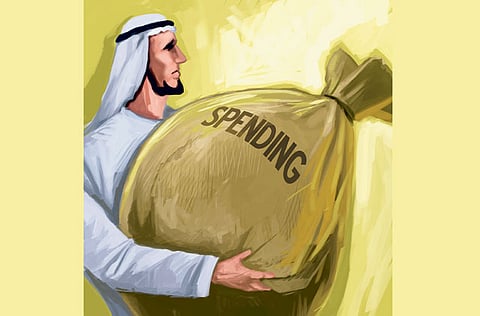GCC should switch to more refined budgeting practices
Region must move to revenue model based on taxes for stability

The volume of spending through the annual budgets of different countries is an important issue. Many economies and businesses hang high hopes on it.
While spending in industrial countries is financed mainly by the tax system, the situation in developing countries — including GCC countries — is entirely different. Here expenditure depends mainly on the government's revenue from natural resources.
The first approach, which depends on taxes, is considered more stable and flexible in adapting to developments, including stagnation and economic crisis. Economies depending on revenue financing — whether agricultural or mineral — are deeply affected by price fluctuations of raw materials, especially crude oil, on international markets.
Hence, government spending in countries with oil-based economies has been subject to periods of rise and fall in accordance with oil revenues over the past four decades.
Those years included the flourishing mid 1970s, early 1980s and the second half of the last decade which continues until today. Nevertheless, the mid-1980s and late 1990s witnessed what was termed in these countries "the phase of austerity."
Advanced infrastructure
It is important here to point out that GCC countries dedicated oil revenues to set up an advanced infrastructure, and develop many modern economic sectors, including trade, transport and communication facilities.
In fact, GCC countries presented a successful model in exploiting oil revenues to develop infrastructure, education, health, housing, and sport facilities.
In GCC countries there is a direct relationship between oil revenue and government spending through their annual budgets.
There is also a parallel relationship between government spending in GCC countries and the implementation of investment projects on the one hand, and the level of wages and salaries that take up a big percentage of government spending.
In 2010, the declared total expenditure in Gulf budgets rose to $269 billion (Dh987.23 billion), an increase of 14.5 per cent from $235 billion in 2009. However the spending rose by 12 per cent by the end of 2010, when the total expenditure reached $301 billion.
The big increase in spending was in three countries: Saudi Arabia, Kuwait, and Qatar. The total budgets of GCC countries this year was estimated at $302 billion, a slight rise over the real spending last year of $301 billion.
However, according to the preliminary data from the first half, a rise of 15 per cent to $347 billion in general expenditure is expected this year.
An increase in spending is expected in part because of the extremely conservative estimate of oil prices on which GCC countries base their annual budgets. Kuwait, for instance, prepares its budget based on an oil price estimate of $45 per barrel.
Though higher oil price estimates were used in preparing the budget in other GCC countries, it did not exceed $80 per barrel, while oil prices remained above $100 in the first half of this year.
Apart from this, Saudi Arabia — with a budget equivalent to 50 per cent of the budgets of the rest of GCC countries put together — announced a big increase in spending of over $100 billion on infrastructure, housing, public facilities and education projects.
Moreover, the rise in international oil prices contributed to reducing deficits in Gulf budgets from a declared deficit in 2010 to a surplus of $55 billion.
Gulf budgets are expected to achieve a similar surplus this year despite the increase in spending.
From the structural point of view, wages and salaries took up the bigger share of spending in Gulf budgets over the past decades. There was also spending on infrastructure projects, which led to the achievement of international standards in terms of quality and level of services.
The strong connection between spending and oil revenues represents a weak point in financing budgets in the long run and places these budgets in a state of flux. This calls for the restructuring of financing of the budgets through a gradual reduction in the use of oil revenues, and utilising these returns to find alternative income for Gulf budgets.
Financing procedure
A unified Gulf tax system has to be set up in a way which suits the economic and social status in GCC countries.
This will be a qualitative move in the Gulf economic system, which still burdens annual budgets with huge sums of money without returns; with some consumers turning into spendthrifts because of the low price of services.
The gradual introduction of a tax system will also contribute to the self-financing of Gulf budgets, which will be less dependent on oil revenues, making these budgets more stable.
Furthermore, the tax system will also contribute to creating strong foundations for many economic indices, especially the correct estimation of the components of the gross domestic products, which is very important in setting up development programmes. This will also offer a great service to researchers, decision makers, and for the development future of GCC countries in general.
Dr Mohammad Al Asoomi is a UAE economic expert and specialist in economic and social development in the UAE and the GCC countries.



